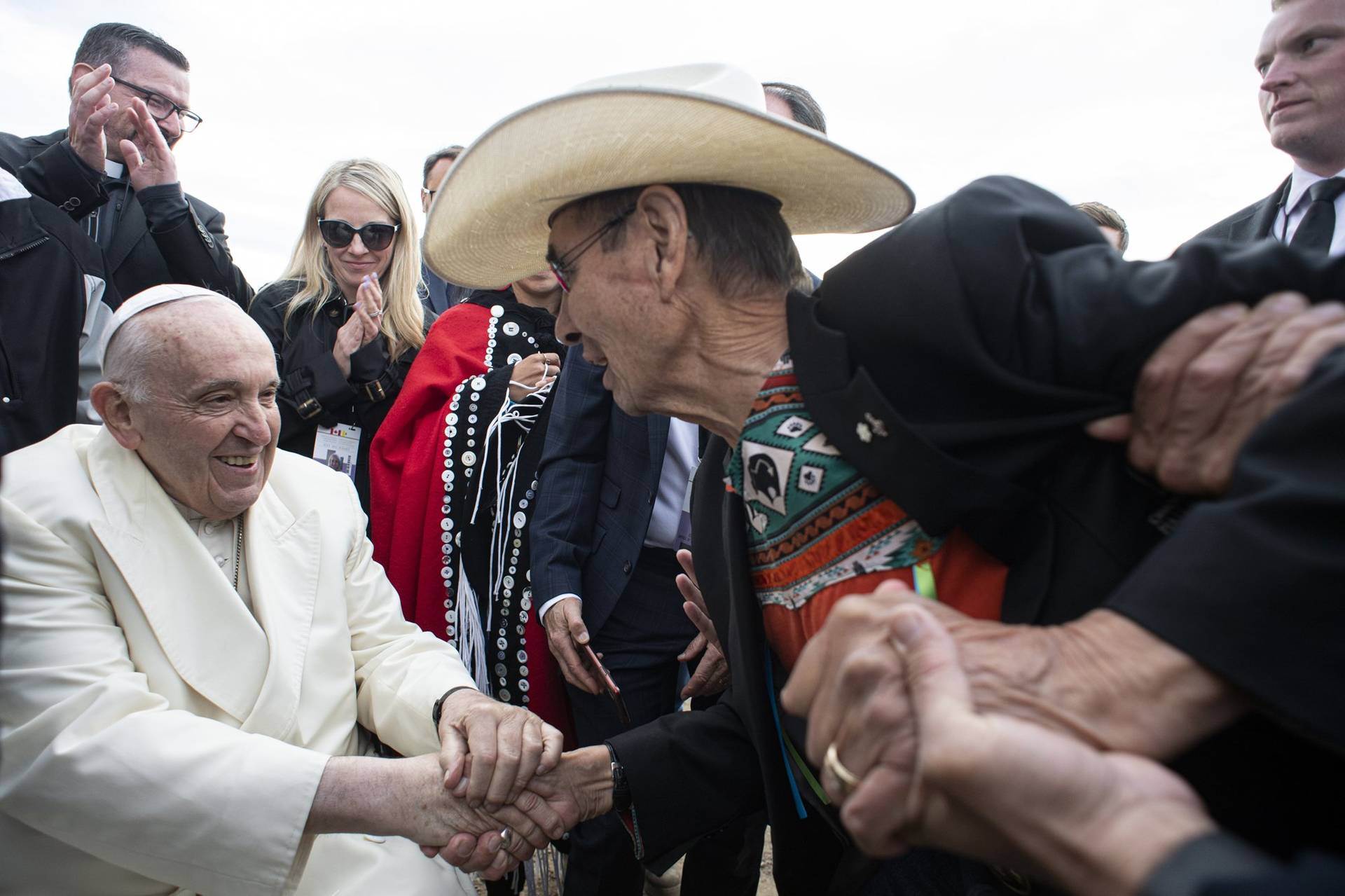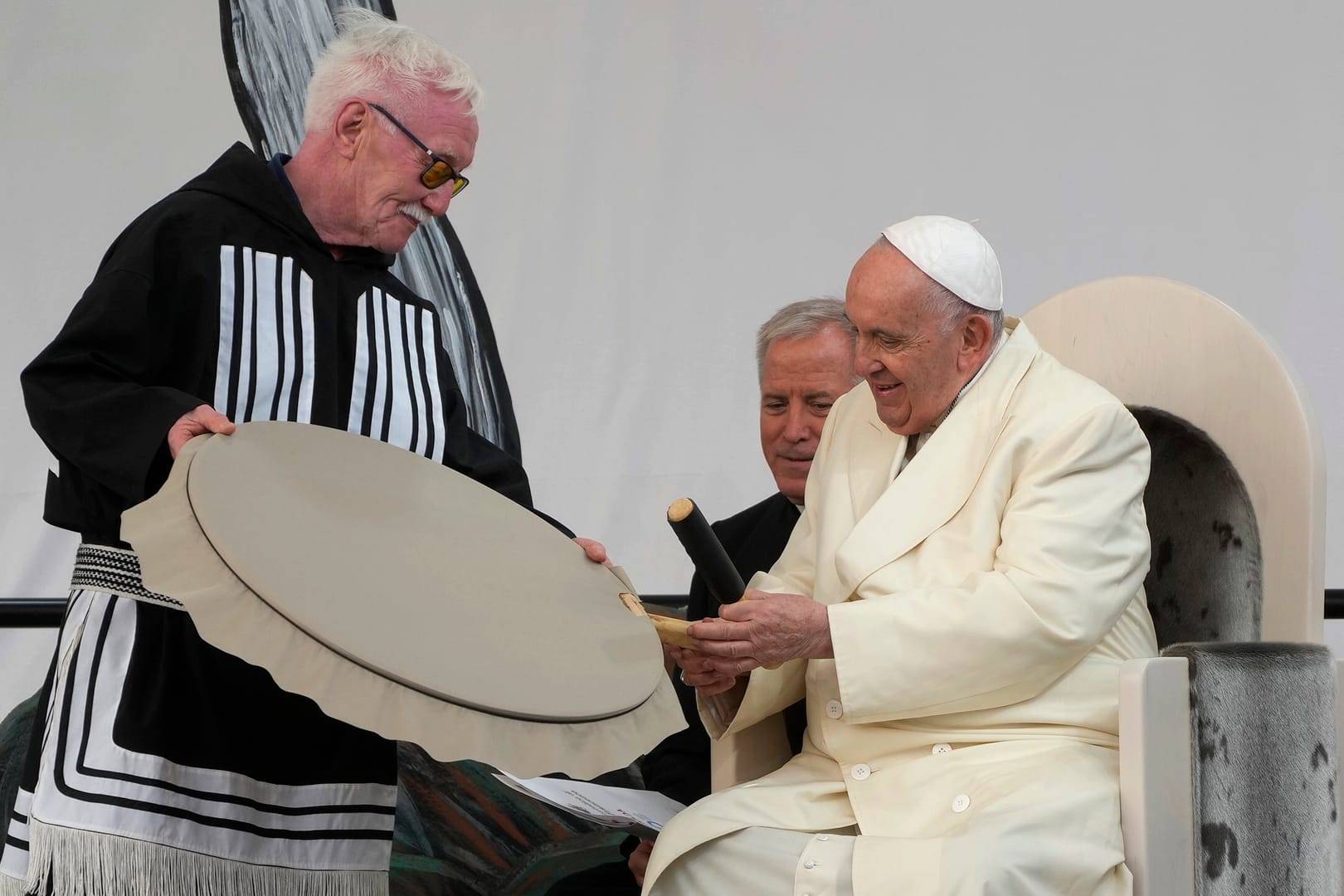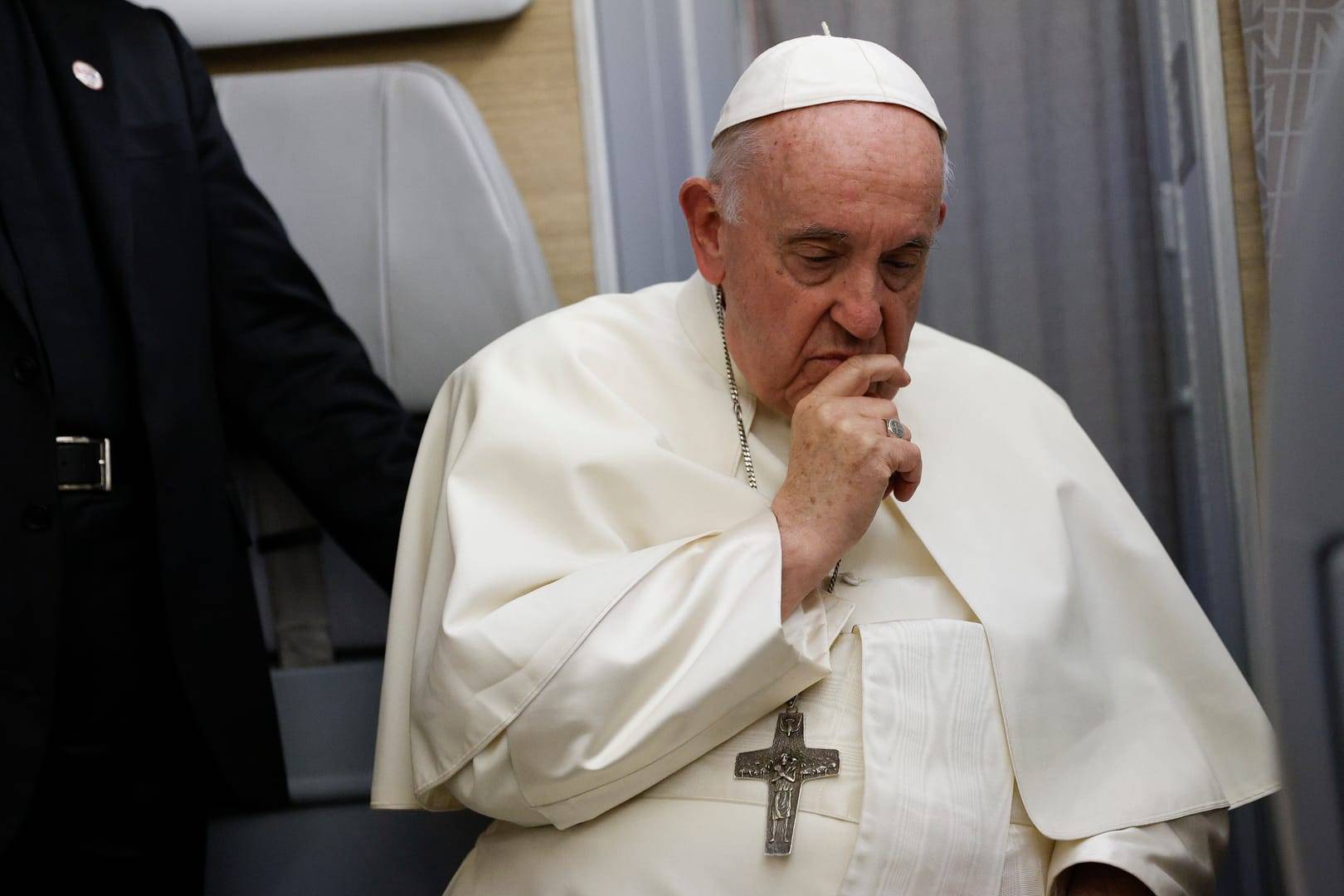ROME – Canada’s leading Catholic prelate has voiced hope Pope Francis’s visit to the country this week will strengthen efforts at reconciliation with Indigenous communities, and help “turn a page” in order to move forward together.
Speaking to Crux, Bishop Raymond Poisson of Saint-Jérôme, Québec, and President of the Canadian Conference of Catholic Bishops (CCCB), said the trip is “a gift of God and a generous act of the pope” given his ongoing knee problems.
“It’s a concrete gesture of reconciliation to turn the page,” Poisson said, saying this doesn’t mean forgetting the past, rather it means thinking “about today and tomorrow, doing something together for a better world, a better society in our country.”
Pope Francis is on his way to Canada for a July 24-29 visit that will take him to Edmonton, Quebec, and Iqaluit, as part of an ongoing reconciliation process with Indigenous First Nations over the Catholic Church’s historic role in the country’s residential school system.
While Canada’s residential schools were a government initiative, many were run by Catholic missionary orders. While still in operation, roughly 150,000 children were forcibly removed from their homes in an attempt to strip them of their native culture. Countless children suffered physical abuse, rape, and malnutrition in what Canada’s Truth and Reconciliation Commission (TRC) in 2015 termed a “cultural genocide.”
While in Canada, Pope Francis is expected to apologize for the church’s role in the abuse Indigenous children suffered in compliance with the TRC’s Call to Action 58, which requested that, as part of the healing process, the pope issue a formal apology on Canadian soil.
Francis will visit Maskwacis, home to the former Ermineskin Residential School, one of the largest in Canada, and he will also hold a private meeting with residential school survivors in the remote city of Iqaluit.
The trip to Canada comes on the heels of an Indigenous delegation’s visit to Rome in March, during which the pope issued an initial apology for the “deplorable conduct” of the church for its role in the residential school system.
During the visit of the Rome delegations, residential school survivors requested an apology on Canadian soil, and they also asked for financial compensation and for the church to open its archives on the residential schools so families can learn what happened to relatives who attended.
In his interview with Crux, Poisson touched on these issues, pointing to the CCCB’s pledge to raise $30 million to benefit Indigenous communities over the next five years, and the recent creation of the Indigenous Reconciliation Fund, which has already begun making payouts, to manage this sum.
RELATED: Ahead of papal visit, Canadian bishops begin payouts to Indigenous communities
The Canadian church, Poisson said, is also in conversation with Indigenous communities about the opening of archives. However, he cautioned that “there is no central fund or archive of the church in Canada about the residential schools.”
“Each community engaged in the history of these schools have their own archives,” he said, saying the issue was also raised with Vatican departments during the visit of the Rome delegations, “and there is nothing in Rome about that.”
Everything is in Canada, he said, saying the archives of communities that ran the residential schools are mostly sacramental, documenting “when these children did their First Communion or Confirmation,” whereas archives on the schools themselves and the children who attended are kept by the government.
Property laws also come into play, he said, but insisted that the bishops in Canada are trying to “do something together in the respect of the limits of these legal possibilities,” and that he hopes there will be further discussion after the pope’s visit.
Pope Francis’s visit, Poisson said, would not have been possible if he had not apologized to the Indigenous delegations during their visit to Rome in March.
“It’s time to make concrete gestures of reconciliation; turn over the page, not to forget, but to go more into the future,” and make steps “for a better society and a better church.”
A new apology in Canada is important, as are the pope’s visits to former residential school sites and his meetings with Indigenous and residential school survivors, he said.
“So, it’s a concrete act and I think we can engage more in this process of reconciliation together,” he said, saying the next step for the Canadian church after the visit will be to further engage with Indigenous communities and “do something together” to continue the path of reconciliation.
“We are trying, and we hope that this will be possible now that there are many, many hopes that are very positive on both sides,” he said.
Noting that some Indigenous communities have voiced frustration that they were not consulted in planning the pope’s itinerary, which is limited given his ongoing knee troubles, Poisson said the CCCB has reserved a significant number of tickets for Indigenous people and communities who do not live in areas the pope will visit, but who wish to attend papal events.
“How the program is made is for this reconciliation with these Indigenous peoples,” he said, saying Indigenous people generally “have a great, great respect for elders and the pope. They recognize it is a very generous act for him to come here in his condition at this time, so I think they understand that this would be easier to bring people to him.”
Canada is a large country, making it impossible for the pope to visit all areas, especially given the limits of his health, but “we did our best,” Poisson said.
In terms of accommodations for Pope Francis, who at times has been confined to a wheelchair due to an inflamed knee ligament and a previous knee fracture, Poisson said there will be a medical team traveling with the pope, as is the case on every international trip, and the itinerary includes “a lot of time for the pope to rest.”
For the most part, Francis has no more than two events per day, and he is limiting his overnight stays to just two locations, making the ardors of travel simpler for the 85-year-old pontiff.
“I hope it will not be too busy for him,” Poisson said, but noted that the pope’s condition is one “of mobility, it’s not a very serious sickness for his life,” so the main concern is making sure he has plenty of rest and doesn’t walk too much.
Both Indigenous and non-Indigenous Canadians alike are enthusiastic about the visit, he said.
“We hope that after this visit, with this witness of the pope engaged in reconciliation, we can also put in place in local communities some concrete actions about reconciliation as a mutual meeting, something to remember, and knowing more about their cultural heritage. That is our hope.”
Follow Elise Ann Allen on Twitter: @eliseannallen














